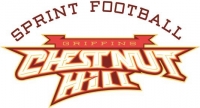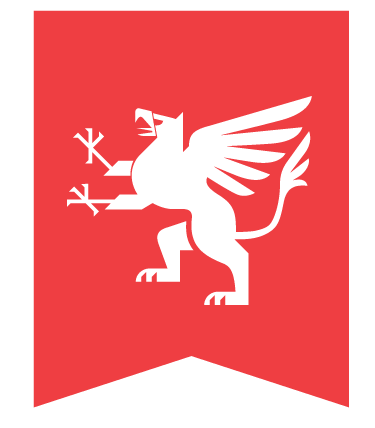
Undefeated Since 1924
For decades, this slogan was seen often on sweatshirts that students wore (ironically) around campus: Chestnut Hill College Football, Undefeated since 1924.
Upon the decision to go co-ed in 2003, the College began adding male athletic programs almost immediately to support the new campus population. Sports such as men’s basketball, baseball and lacrosse were chosen and over the next few years, the buzz around campus was, “Will football be next?”
However, at the time, the logistics of establishing a full-fledged football program were challenging. The Division II Central Atlantic Collegiate Conference (CACC), of which CHC is a member for all of its sports except men’s lacrosse, does not sponsor football. Additionally, there was the matter of setting up the proper infrastructure that a NCAA football program requires. A football team therefore, seemed like a pipe dream.
But prior to the summer of 2014, Chestnut Hill got creative and opted to go the “traditionally untraditional” route the institution has been known for. Through research and consideration, the College discovered the Collegiate Sprint Football League (CSFL) and found it to be the perfect way to add a football team while not requiring all of the bells and whistles of an NCAA-run program.
In July 2014, in a historic statement, the College announced it had been accepted as a member into the CSFL, joining CACC-rival Post University; Ivy League institutions, Cornell, Princeton and Penn; U.S. military academies, Army West Point and Navy, as well as Franklin Pierce and Mansfield universities.
Officially, the College is now undefeated since 2015.
Ready, Set, Sprint!
Sprint football is simply a lesser-known brand of football. It operates under the same rules as regular college football, with one exception: all players must weigh less than 172 pounds.
According to Mike Pearson, assistant director of athletics and newly appointed head sprint football coach, that distinction makes all of the difference.
“I’ve had friends, fellow coaches, at games and I ask them to look at it and tell me what they see,” says Pearson. “Usually the size of the players catches people at first but that’s about it. The game itself is the same you see played in the NFL every Sunday or at the NCAA-level every Saturday.”
The players’ size allows sprint football to be a quicker, more fast-paced version of the game, one where the defensive linebacker could just as easily catch a wide receiver streaking down the field as his teammate already in coverage in the secondary.
“You don’t see that in a game where your linemen are 200- or 300-some pounds,” says Pearson.
For CHC, joining the CSFL, means adding its name to the company of some of the best universities in the country. It creates a pedigree for an institution that prides itself on excellence in all forms, no matter how uncommon or untraditional they may be.
“Sprint football is untraditional, yet it’s extremely competitive, so it’s uncommon, but the quality of the student athletes playing is very high. There’s definitely excellence to it,” says Pearson, who served as a defensive back/wide receiver/tight end coach for Mansfield University’s sprint football program before coming to CHC.
Building from the Ground Up
Hired to take on the program from its onset, Pearson’s first goal was to get the name out there, and to let high school area coaches and student athletes know that CHC had added football, as well as to embrace the students already on campus and to engage those with interest in joining the team.
Pearson’s timeline also consisted of building the day-to-day operations of a football program, establishing a structure and culture that would enable the team to create and maintain a level of success, interviewing and choosing the right coaching staff, and preparing for the inaugural season.
All of these tasks were bookended by recruiting, lots and lots of recruiting.
“Small school recruiting, which I was brought up on while at Lycoming College, taught me that it’s a marathon not a sprint,” says Pearson. “We’re constantly recruiting. It’s just never stopped.”
Critical to the success of the program, Pearson’s recruiting efforts brought in 33 new students to campus, including Jonathan Baldwin ’19, who after completing four years active duty in the Army and two tours in Afghanistan, decided to pursue college.
“Sprint football had a huge impact on me becoming a Griffin,” says Baldwin. “I got into Drexel but playing football is something I wanted more.”
Baldwin and the 32 other new recruits, join a diverse blend of CHC upperclassmen in making up the inaugural roster, such as Duncan Malone ‘16, who are eager to play, for if nothing else, the love of the game.
“I played football for my high school in Boston, where we were all about speed and stamina, and having power to go with it,” Malone says. “When I found out CHC was adding sprint football I was excited as I wanted to experience that intensity again. I love the sport and love to play it even more.”
Dylan Hyland ’15, another former high school and pop warner player, shares the same sentiment.
“I’d been yearning to play football again so I was extremely excited,” says Hyland. “It’s an honor to be a part of the first ever team and I couldn’t resist the opportunity to get back on the field.”
A Two-Year Plan
Chestnut Hill enters the league as provisional members in the Fall of 2015, meaning that the team’s first season of play will consist of a smaller schedule, in order to allow the program to grow and prepare for the full slate of games next year.
According to Pearson, the provisional year is set up in such a way to protect CHC’s program as well as to ensure its long-term health and viability.
“Ultimately, it’s all about creating one more quality team in the league,” he says, “and the provisional year allows us to do that.”
However, just because the team is only playing five games and just because they won’t have a chance to test themselves against Army and Navy, the powerhouses of the CSFL, does not mean that Pearson doesn’t have expectations.
The coach has a two-year plan which includes getting through this year and preparing for the next. In order to do so, the team practices five-six times a week, with a focus on skill development at the individual, small group, and full team level.
It is all about as Pearson says, “creating a team that has a chance to compete as well as fostering a football culture that fits into the CHC culture.”
“We’re going to work as hard as we can and at the end of the day, the quality of our team has more to do with what we develop than it does our opponents,” says Pearson. “Not playing the full league is just the reality of the situation but it doesn’t change our goal to be the best team we can be as quickly as we can be.”
Chestnut Hill College opens their season with a scrimmage at Penn Park against the University of Pennsylvania on September 5, followed by the home opener on Saturday, September 19 at 12:00 p.m at Plymouth Whitemarsh Football Stadium in Lafayette Hill. The full schedule of CHC’s games can be found here.
— Marilee Gallagher ’14







